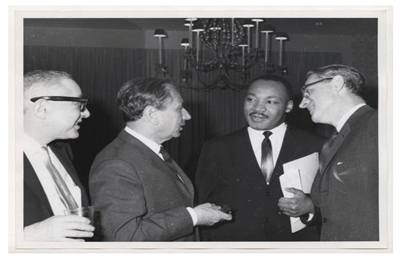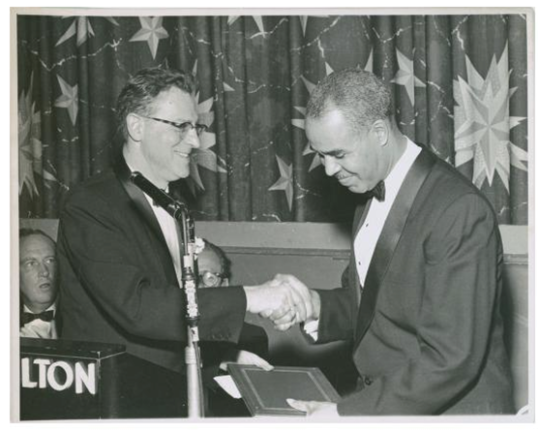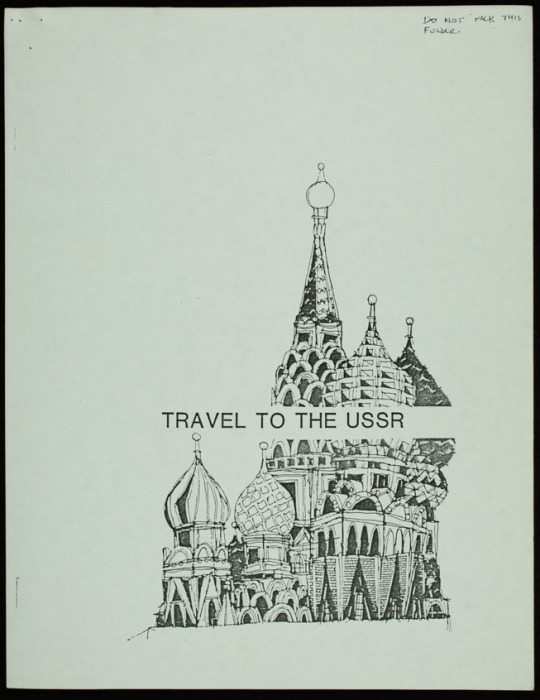By Poorvi Bellur
Part 1: Shad Polier
Read Introduction
“The AJC began developing its program of using
legislation and litigation to protect human rights in 1944 and 1945. At that
time many respectable “liberal” organizations told us not to get involved in
these projects. We ignored them and went ahead. We did so not because we’re a
“liberal” organization but because we’re a Jewish one.” – Shad Polier

Joachim Prinz, Martin Luther King, Jr., and Shad Polier
(American Jewish Historical Society, American Jewish Congress records, undated, 1916-2006, Call #I-77, Box 740, Folder 33)
Born in Aiken, South Carolina, Shad Polier
was deeply aware of the systemic racism and resulting violence surrounding him
in his hometown, leading him to nurture his desire to someday facilitate reform
of “ not only that, but other unfair things”[1].
Mr. Polier took this drive to become one of the most well-known Jewish social
justice lawyers of the 20th century. He was in conversation with some of the
most influential thinkers and politicians of his day, including Dr. Martin
Luther King Jr., First Lady Eleanor Roosevelt, Roy Wilkins, Thurgood Marshall,
Hubert Humphrey, John Haynes Holmes, Rabbi Stephen S. Wise, and Adlai E.
Stevenson. A student at the University of South Caroline, Shad Polier was
horrified by the brutal racism he witnessed around him as he later recalled
“Yet by the time I’d finished at the University of South: Carolina, there had
been three separate lynchings in Aiken”[2]. After graduating from college, Polier received
admission into Harvard Law School in 1929 and received a Masters degree by
1931.
Except for a brief stint in the private
sector in New York, Polier’s career for the most part revolved around social
justice law and civil rights reform. Just two years after his matriculation
that country was consumed by the famous Scottsboro trial
and the debates raging around it. Soon after this Polier became an active
member of the NAACP, serving on its legal and education defense fund. By 1945,
he became keenly involved in the work of the American Jewish Congress under the
leadership of his father in law, Stephen Wise. As a part of the AJC, Polier went on to found
and chair of the commission on Law and Social Action of the AJC, which launched
legal battles against anti-Semitism, segregation and racism. A contributor to
the AJC’s weekly on civil liberties, Polier helped pass the first statewide
Fair Education Practices Law in 1947 prohibiting discrimination in college
admissions based on race or religion.

Roy Wilkins receiving Convention Award from Shad
Polier at National Convention
(American Jewish Historical Society, American Jewish Congress records, undated, 1916-2006, Call #I-77, Box 745, Folder 21)
The
American Jewish Historical Society’s archives containing Mr. Polier ‘s papers
offer a wealth of resources on the fight for civil liberties as well as a
window into the tumultuous relationship between the Black American and Jewish
American communities in the early 20th century. In a comprehensive
essay for an undated issue of the Office of Jewish Information (AJC) News
Release entitled ‘The Jew and the racial crisis’[1],
Polier explored the need for Jewish involvement in the Civil Rights movement,
as “not a negro struggle, but an American struggle–the struggle for human
equality and human dignity”. He expounds on the issue of school desegregation
and states “We Jews believe that there is room in America to provide a full
economic life for everyone” and criticizes the standpoint that de-segregation
will lead to the influx of slum communities into urban areas. He argues that Jews
as a part of the white community have fallen trap to this perception, despite
being separate from the white community in that they value and remember the
history of their oppression.
Polier’s
papers contain evidence of not only the AJC’s commitment to the cause of Civil
Rights, they also reveal the opposition to the AJC’s focus on Civil Rights from
within the Jewish community itself. In a newspaper article from May 14th
1960, reporter George S Schuyler reported on this alleged internal conflict,
headlined “Jews Deny ‘Heated’ Feud over Negro Rights Issue”[2].
The article cites alleged internal opposition to the organization’s emphasis on
the Civil Rights movement, with other Jewish American organizations threatening
to withdraw support if the Civil Rights movement remained a priority. An
article by Gershom Jacobson from the National Jewish Post on April 20th
of the same year asks “Should the congress give priority to a full Jewish
program or should priority be given to civil liberties and Negro rights?”[3].
Polier
and his colleagues at the AJC responded to these challenges by asserting that
the best way to ensure equal rights, safety and opportunity for Jews in America
is to correct the undemocratic nature of racist discriminatory legislation, a
goal that therefore aligned the AJC’s mission with that of the NAACP and the
leaders of the Civil Rights movement. In 1966, Polier joined Cleveland Robinson
(Secretary treasurer of District 65 of the Retail, Wholesale and Department
store union) and Samuel Hendel (Prof. of Political Science at City College) at
a Symposium on Negro-Jewish Tensions[4].
The transcript of Polier’s speech at the event preserved in his papers is most
revealing of the crisis in Jewish support for Civil Rights at the time.
[1] “The Jew and the racial crisis”, Office of Jewish
Information News Release, American Jewish Congress, Shad Polier Papers Box 7,
Folder 4
[2] “Jews Deny ‘Heated’ Feud over Negro Rights Issue”,
May 14th 1960, George S Schuyler, Shad Polier Papers Box 7 Folder 4
[3] National Jewish Post and Opinion article by Gershom
Jacobson, Shad Polier Papers, Box 7 Folder 4
[4] Transcript of Symposium on Negro-Jewish Tensions,
April 7th 1966 in the Stephen Wise Congress House (Shad Polier, Cleveland
Robinson, Samuel Hendel), Shad Polier Papers Box 7 Folder 4
[1] “Shad Polier, Lawyer, Dead; Active in Civil
Rights Cases.” The New York Times. The New York Times, 01 July 1976. Web.
14 Apr. 2017.
[2] “Shad Polier, Lawyer, Dead; Active in Civil
Rights Cases.” The New York Times. The New York Times, 01 July 1976. Web.
14 Apr. 2017.

